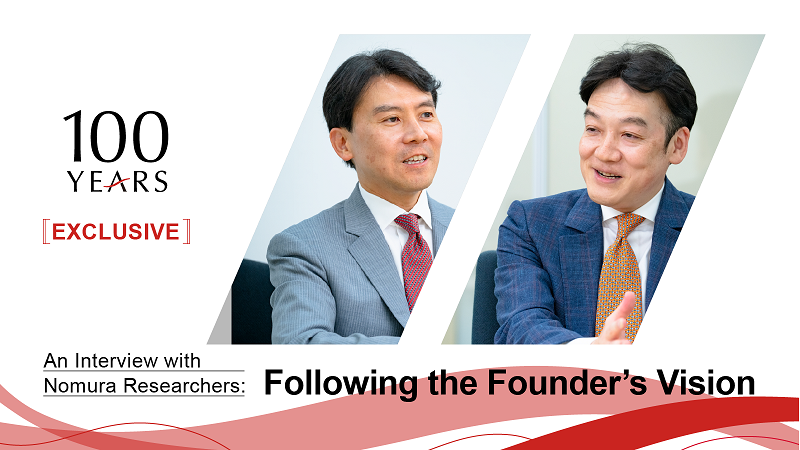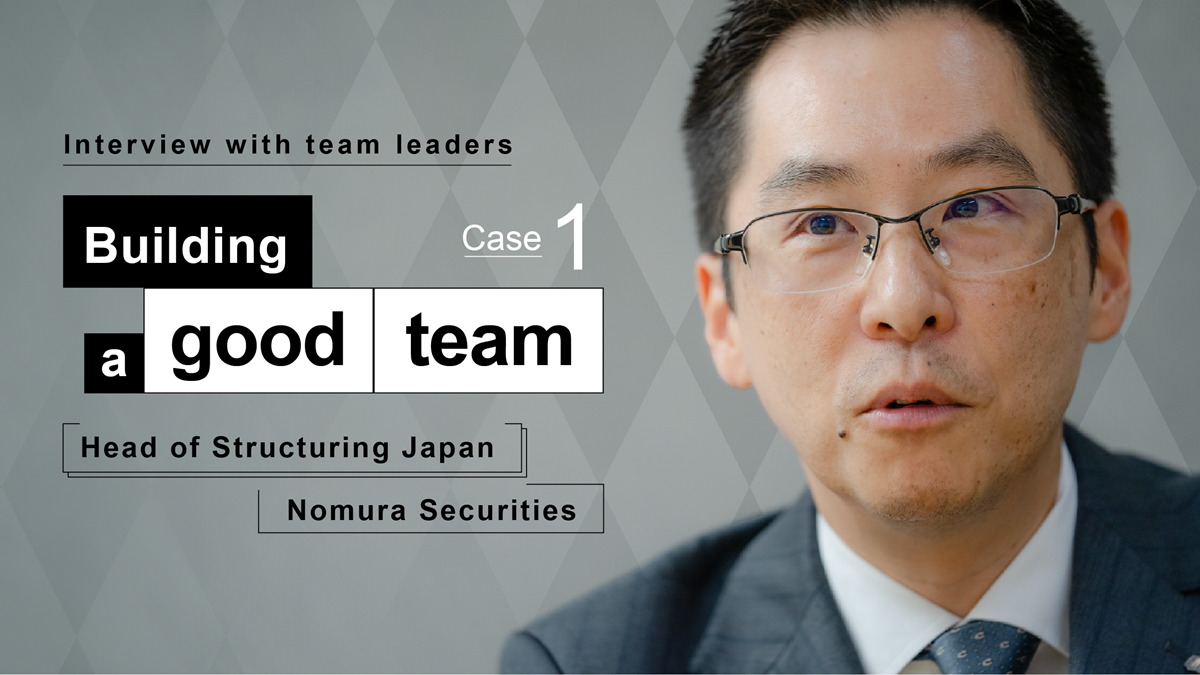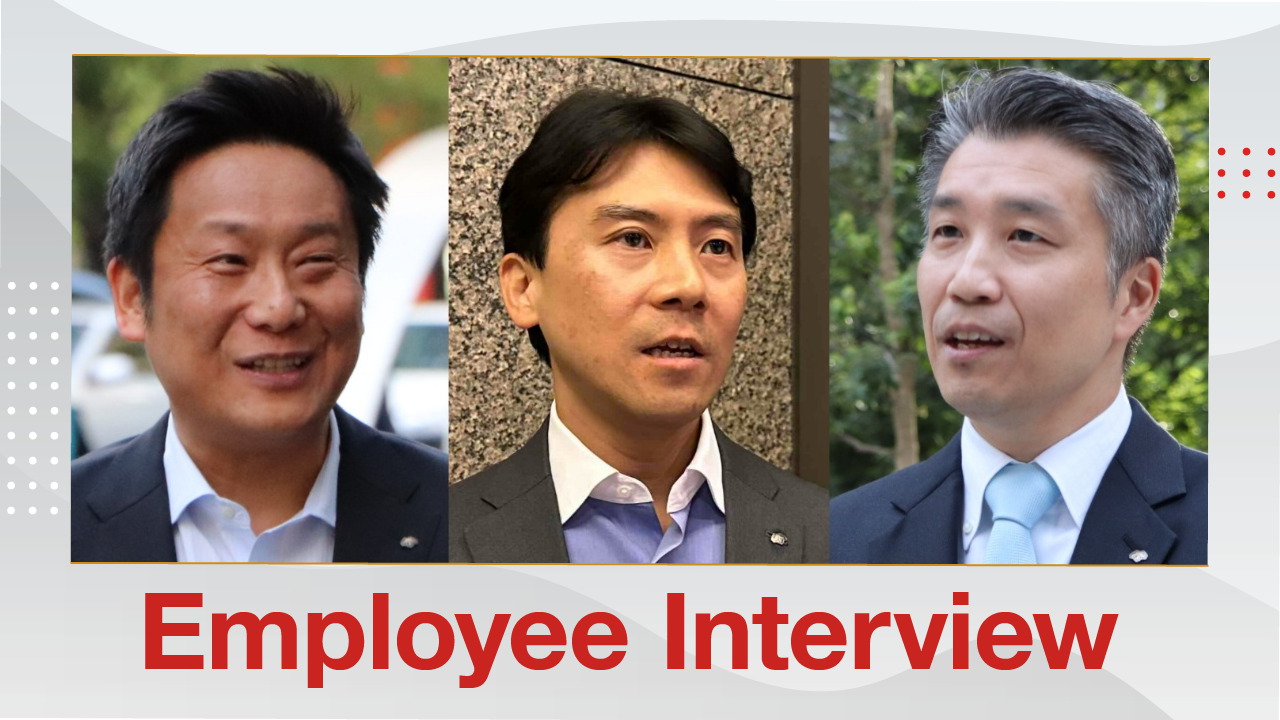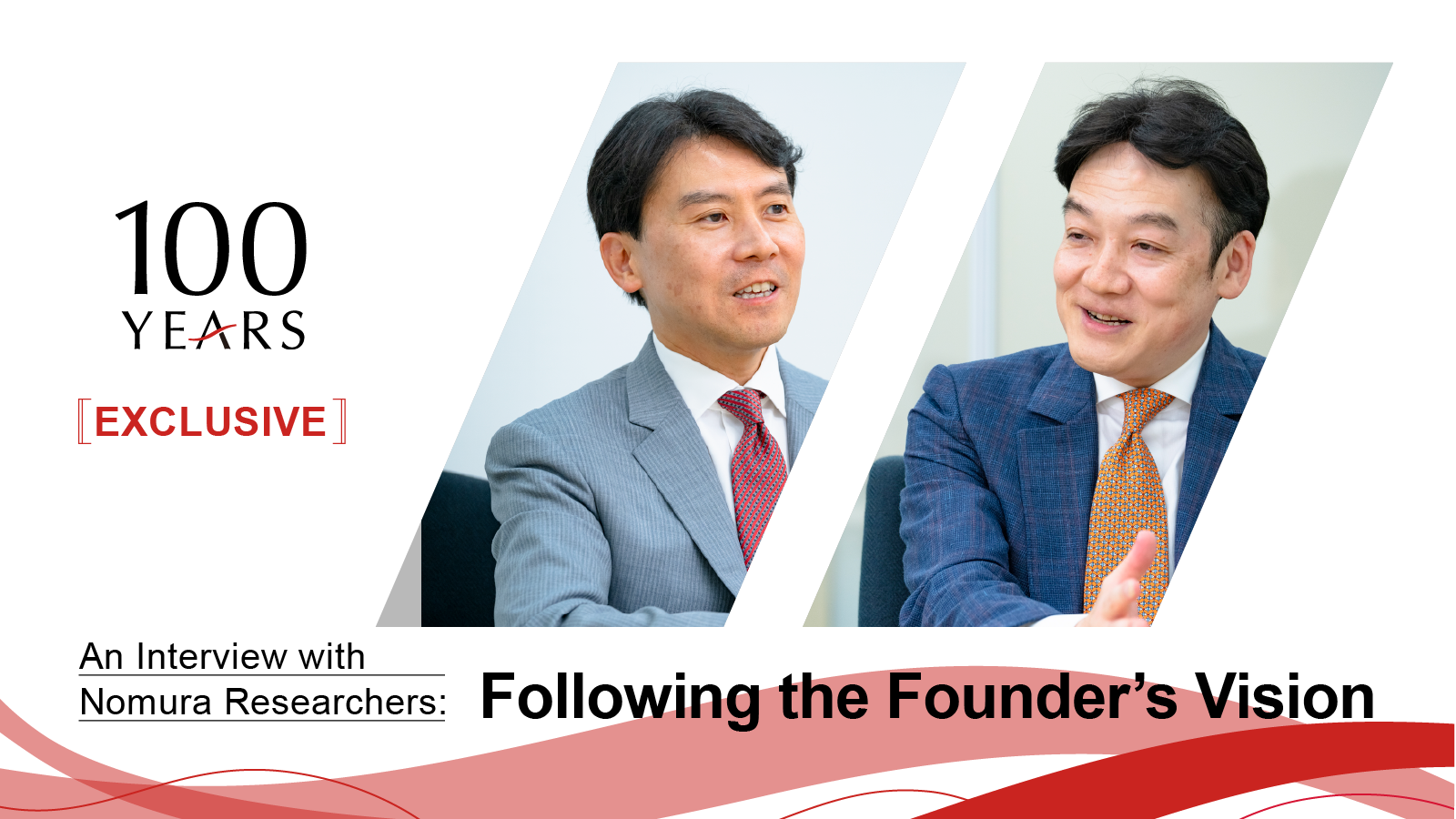
The Nomura Group has about 400 researchers and research consultants. Research has been an integral part of the company since 1906 when the Research Department was established at Nomura Tokushichi Shoten, the predecessor of Nomura Securities.
Nomura’s founder, Tokushichi Nomura, once wrote that, “We have a duty to research scientifically the intrinsic nature of all securities”. This belief laid the foundation for what has become known as Nomura Research. We asked two researchers — Yunosuke Ikeda, Head of the Economic Research Department and Market Strategy Research, and Yuji Matsumoto, Head of the Equity Research Department — who are carrying on this spirit, about the current state of Nomura Research and the perspectives of its researchers.
Q. What kinds of people are researchers?
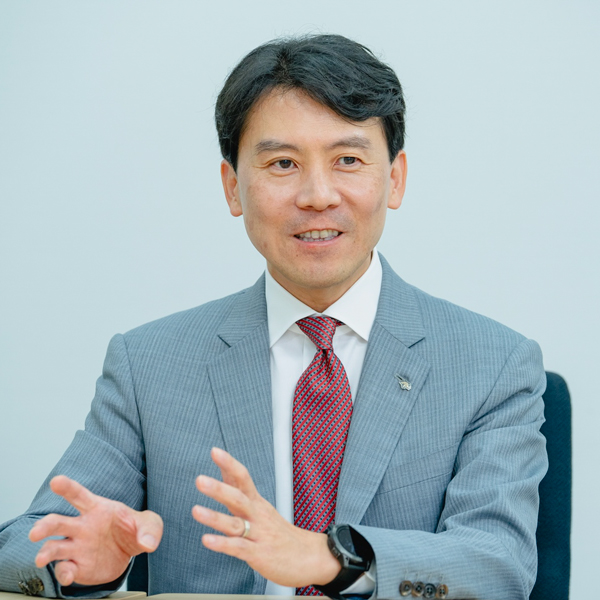
- 拡大
- Yunosuke Ikeda
Head of the Economic Research Department and Market Strategy Research
Nomura Securities
Yunosuke Ikeda: The roles of economists and strategists are very different. Economists analyze economic indicators like GDP, inflation, the unemployment rate, and the actions of the Bank of Japan to forecast changes in the economy. Strategists analyze markets — such as the foreign exchange, bond, and stock markets — to formulate investment strategies.
The backgrounds of researchers are becoming increasingly diverse. Many join the department because they want to do research, but others come to us mid-career from financial institutions or from the government’s financial markets departments. Researchers’ academic credentials aren’t just in economics anymore. We see people who studied law, political science, and international relations. Recently, there has been an increasing number of researchers with STEM backgrounds who have skills in data analysis.
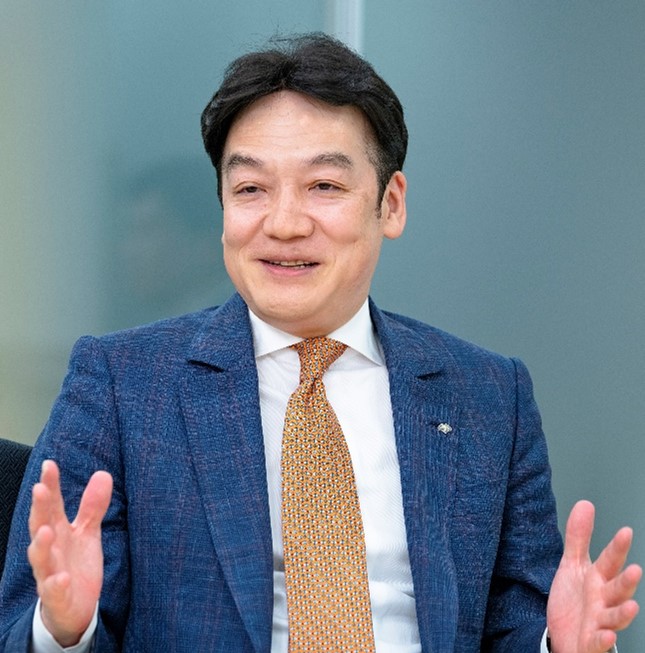
- 拡大
- Yuji Matsumoto
Head of the Equity Research Department
Steel, Non-Ferrous Metals, and Cabling Analyst
Nomura Securities
Yuji Matsumoto: The equity research analysts in our department focus on financial and industry analysis of individual listed companies. They also conduct interviews with executives to help them evaluate the investment value of corporate stocks. Most of them have humanities or social sciences backgrounds, but some studied STEM subjects. Analysts of companies in the pharmaceutical industry need to have specialist knowledge, so many of them have backgrounds in medicine or pharmaceuticals. Some even hold doctoral degrees.
Q. You both have about 30 years of experience as researchers. What beliefs do you hold about your work? Have those beliefs changed over time?
Ikeda: When writing reports or speaking with clients, I have always considered it essential to be honest, without hiding what I think, but also without adding anything unnecessary. My university professor drilled into us that we should question conventional wisdom. We learned that what is commonly believed is not necessarily right, and we should question everything. I’m naturally skeptical [laughs], so I’ve always focused on providing our clients with honest, straightforward research.
In terms of how my thinking has evolved, in the past, if I truly believed something was right, I held to that belief — even if my predictions were off — and I assumed the market was wrong. But, in reality, markets aren’t about logical correctness. They’re about what people collectively believe. One of the most important lessons I’ve learned after years as a researcher is how vital it is to understand investor psychology.
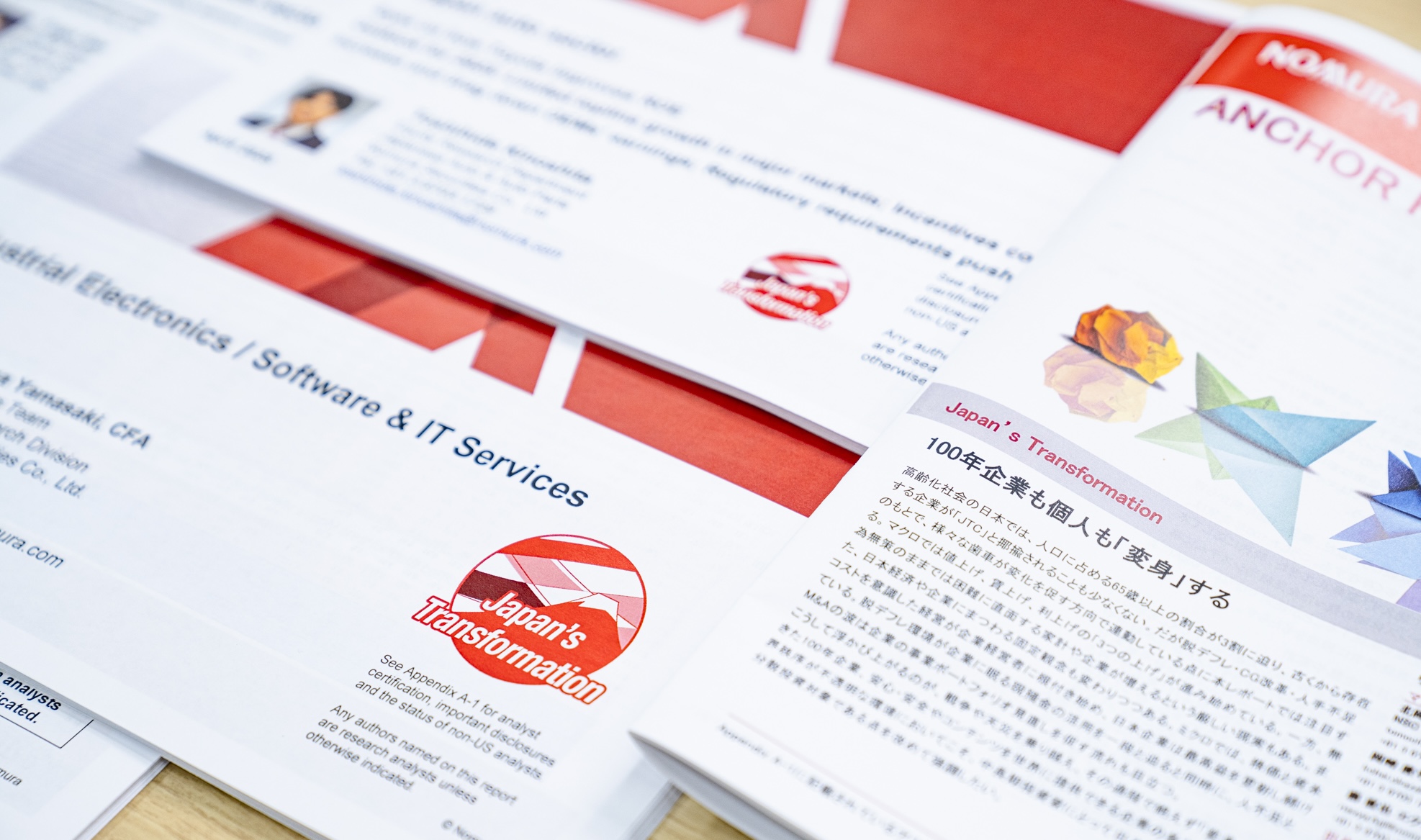
- 拡大
- Nomura has around 400 researchers and research consultants, with industry specialists publishing thousands of reports per year for investors
Matsumoto: I have a similar view. I try to give objective opinions, without any bias. That doesn’t mean being neutral but honestly stating the conclusions I’ve arrived at based on a variety of data, and without being affected by external factors or personal preferences. So, how can you maintain a fair perspective? One way is by carefully examining the historical data. Although anyone can do this given enough time, there are quite a few people who neglect this step.
Another important point is not to lose sight of the big picture. The economy is interconnected, so it’s important to look not just at a single company but at related companies and those overseas, as well. Over time, experience gives you an edge in accurately predicting how a company will act in certain situations. But I still need to be careful not to overlook the real, transformative changes taking place within a company.
Q. It sounds like you’re very exacting with your research, so what do you hope to achieve when you share your findings with clients?
Ikeda: I think there’s nothing more important than having clients say, “This is the kind of quality we expect from Nomura.” Doing the right thing and having our work be valued by clients is what’s most rewarding.
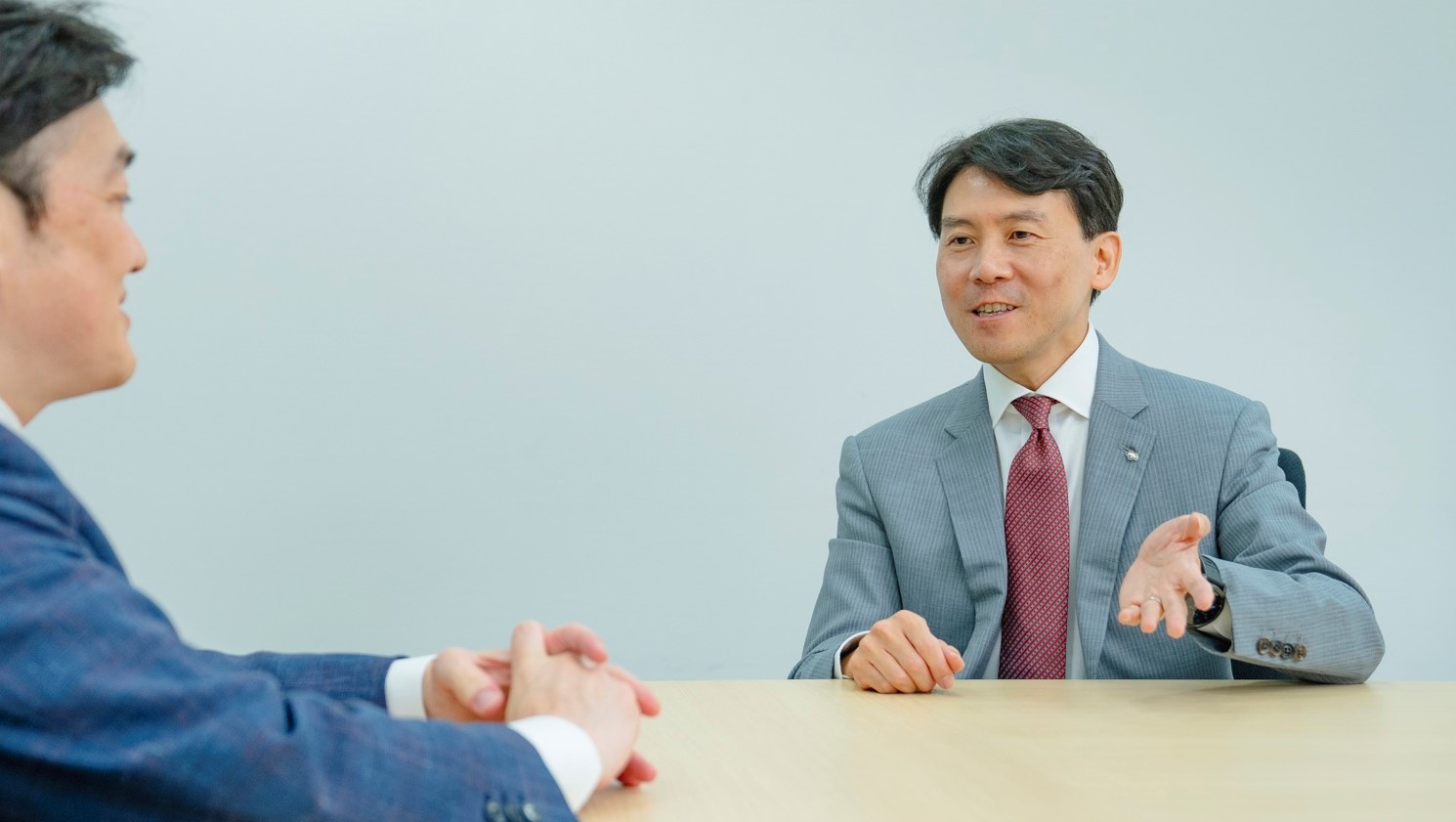
Q. What do clients expect from Nomura’s research?
Ikeda: They often say they want Nomura to be like a sumo grand champion — meaning we should be bold, straightforward, and not pull any tricks. Nomura is already well known here in Japan, so there’s no need to try and attract more attention. Clients expect us to just tell the honest truth. Ideally, this honesty can help us differentiate ourselves, and there’s nothing better than when clients appreciate our accurate, honest insights.
Matsumoto: Forecasting corporate quarterly earnings is important, but clients want deeper analysis of the long-term changes taking place in industries, at companies, and with new technologies. Recently, I’ve been feeling that they have expectations for Nomura to take an even more comprehensive approach, such as through greater collaboration among our economists, strategists, and overseas researchers.

- 拡大
- Researchers traveled the world for the Japan’s Transformation initiative and caught the attention of investors across the globe
Q. Nomura has a global marketing initiative called the Caravan, where macroeconomic and microeconomic research teams collaborate to deliver research information, correct?
Ikeda: Yes. Teams of economists, strategists, and analysts travel to cities around the world to tell investors about the dynamic developments taking place in the Japanese economy and the medium- to long-term potential of the Japanese market. The Caravan is also a great opportunity to showcase Nomura’s comprehensive strengths in research. The macro and micro teams share information with one another daily, but occasionally we work on large-scale research projects that combine both perspectives. The Caravan is one of those.
In August 2023, during the “Revisit Japan” Caravan, we created a report exploring trends in price increase strategies. Macro economists and strategists, including myself, discussed price indexes and the labor shortage, while analysts explained how each industry is implementing pricing strategies. Matsumoto-san prepared a report on steel manufacturers that were negotiating price increases. Several other real-world cases from other sectors were referenced, as well. Since this topic was being monitored by overseas investors, I remember people telling us, “This is the kind of quality we expect from Nomura.” This experience reaffirmed for me how just how convincing data can be when it is backed it up with real-world corporate trends.
Matsumoto: Sometimes analysts can miss things when they’re working alone. Hearing macro researchers talk from a big-picture perspective can be eye-opening and lead to new research ideas. These events also give us the opportunity to interact with economists and strategists we don’t often speak with, which can lead to more collaboration. I think the Caravan is a great chance to highlight all of Nomura Research’s strengths and abilities.
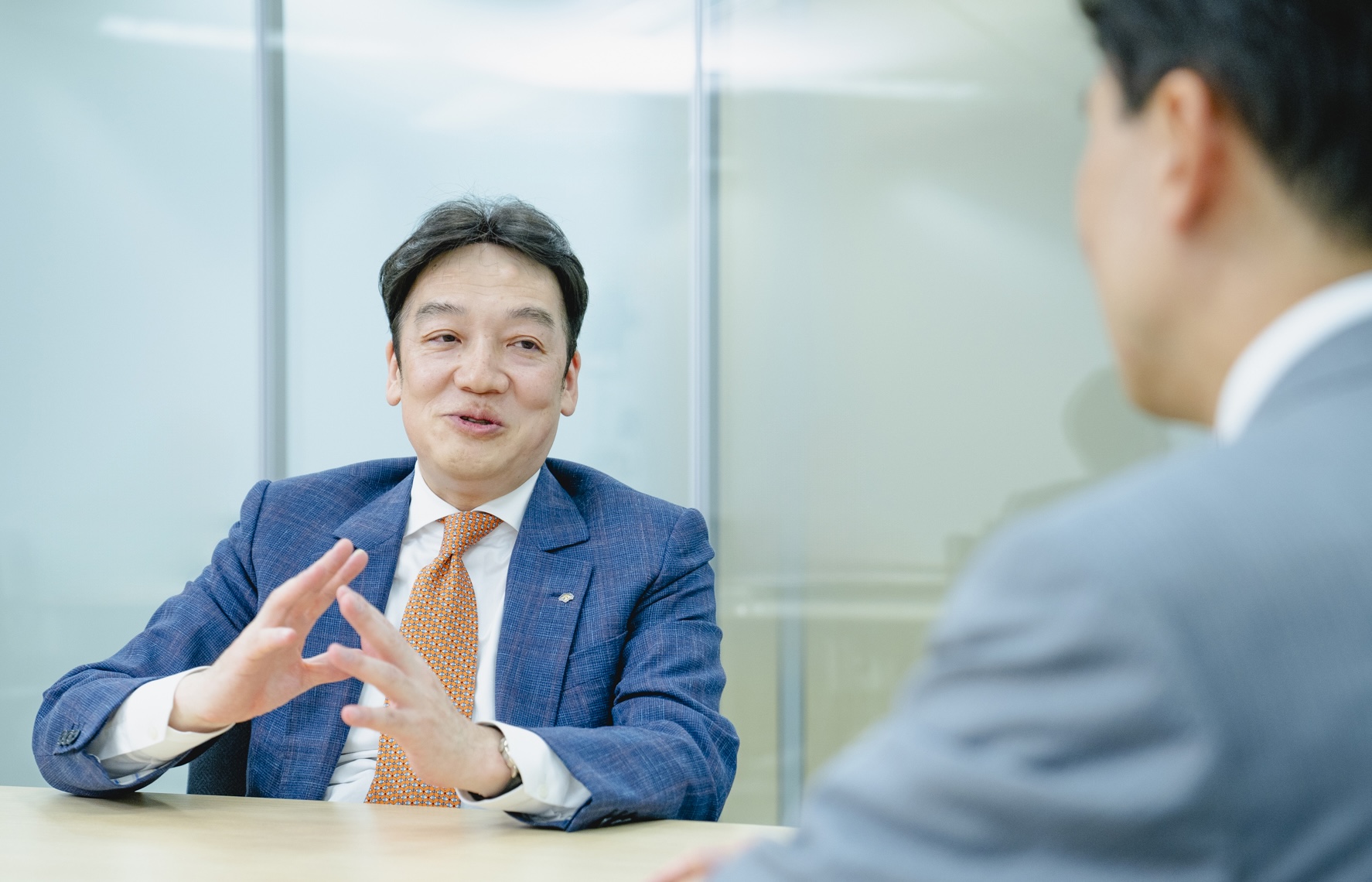
Q. What is the current status of Nomura’s global research?
Ikeda: There were a large number of overseas researchers who joined us when we took on staff from Lehman Brothers in 2008. Our client base expanded to include overseas hedge funds, as well as other clients. At that time, I was a currency analyst, and I remember a big increase in inquiries from other countries about the Japanese yen. For example, during the European debt crisis around 2011 when the yen strengthened rapidly, clients were asking us about the timing and scale of the forex intervention of Japan’s Ministry of Finance. During Abenomics and the yen’s depreciation, they relied on Nomura as the most knowledgeable source of information about Japan, and we were able to provide them with extensive information. Lehman Brothers’ integration into Nomura was a major benefit for the company. Since then, overseas investors have had a clearer understanding of Nomura’s strengths, especially in Japan and Asia.
Matsumoto: The focus of our research on individual stocks has shifted toward Asia. This is especially true of the technology sector, particularly semiconductors, where Asia plays an important role, so we collaborate closely with researchers in South Korea and India. Since 2020, we have also been strengthening our research into US stocks by exchanging information with Wolfe Research, one of our strategic partners.
Q. What do you expect from the younger researchers who will be responsible for leading Nomura Research in the future?
Ikeda: It’s important for researchers to be competitive. Being able to do the things that others have already done should be the starting point for them. I want them to tackle areas that no one else has explored and turn those into strengths that will help them distinguish themselves.
There isn’t one single formula for becoming a great researcher. Some get noticed by writing a lot of reports. Others rarely write reports, but they become popular because of their good communication skills and engaging presentations. Those who can leverage their strengths will be successful. I want them to find an area they can specialize in so they can become unrivaled experts.
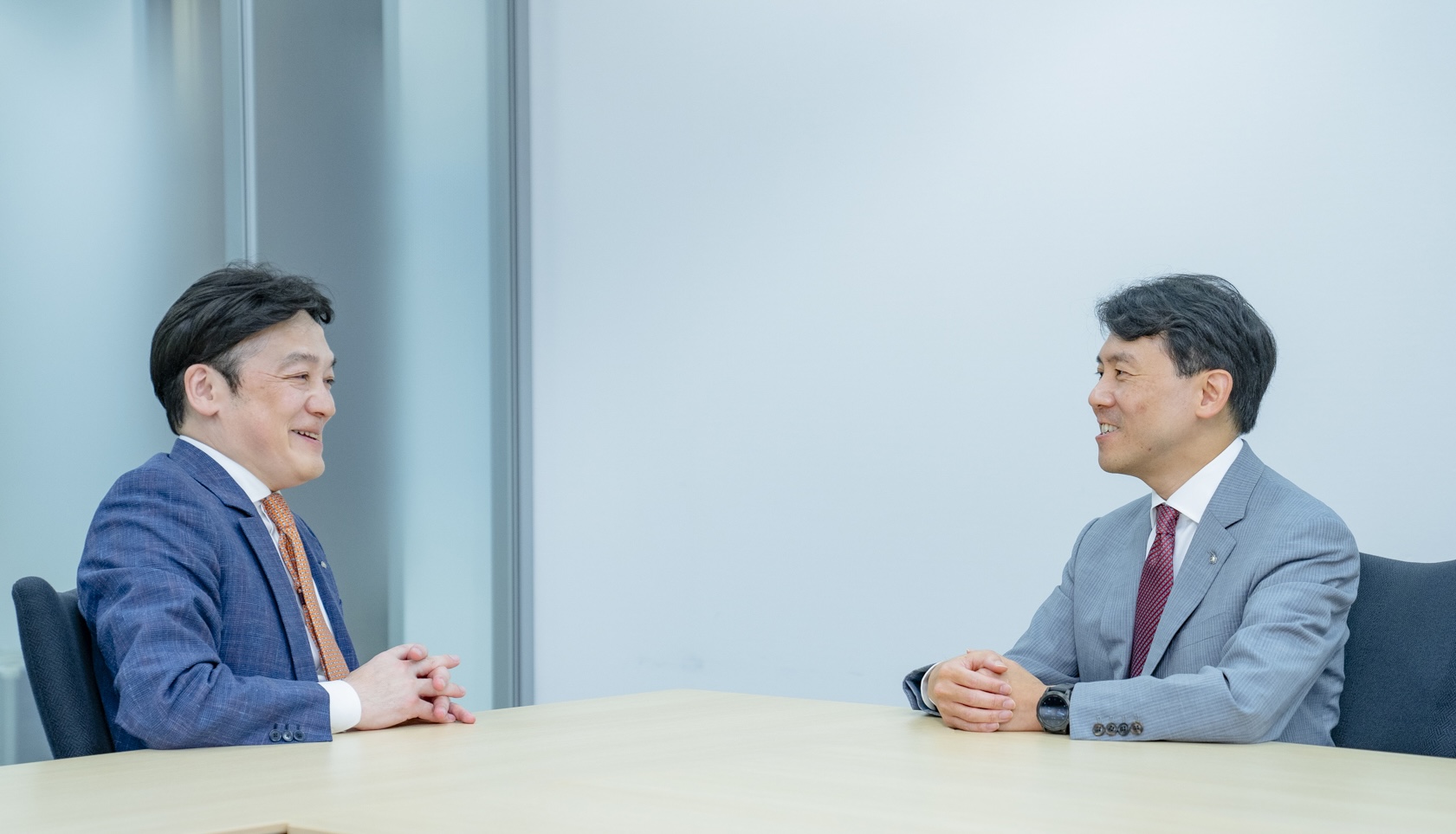
Matsumoto: Just because someone is a top analyst doesn’t mean others should just replicate their approach. That’s the interesting thing — there’s freedom to develop your own way. When you’re young, it’s important to absorb the good qualities of all the people around you, not just your boss. Then find your own style.
What matters most is that you never simply accept that you don’t understand something. Clients want to gain more clarity about what’s uncertain. Trying to predict what’s uncertain is our job, so I want young researchers to challenge themselves to use different ways to find the best possible answers. Most of all, I want them to carry the spirit of Nomura Research and understand that they are the ones who will be the leaders in Japanese research.
Q. To close out, what are the greatest strengths of Nomura Research?
Matsumoto: I would say that our greatest strength is that we have comprehensive capabilities. In addition to our chief economists and strategists, there’s substantial depth on both the macro to micro levels.
Ikeda: It’s also that young people have an environment where they can really thrive. There’s a culture that allows them to be a bit daring, which is great.
Matsumoto: Sometimes, we even let second-year analysts look after individual stocks. Giving young researchers opportunities to take on challenges has always been one of the strengths of Nomura Research.
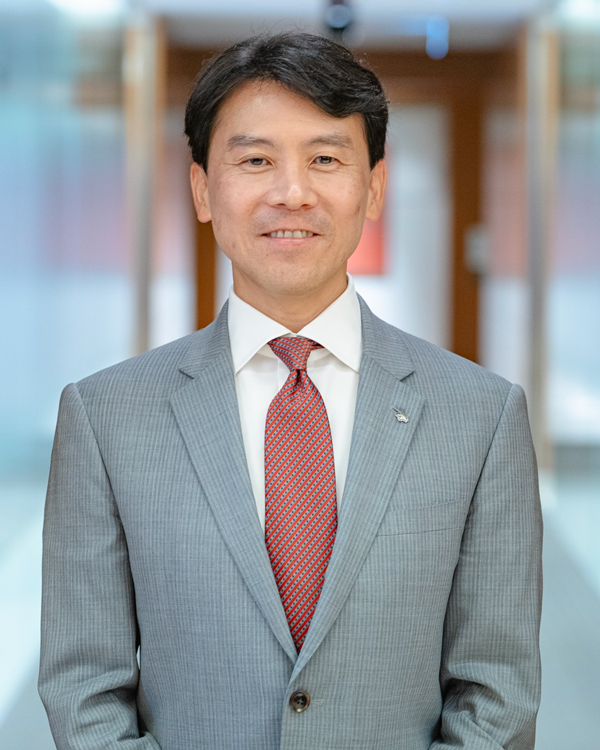
Yunosuke Ikeda
Head of the Economic Research Department and Market Strategy Research
Nomura Securities
Yunosuke Ikeda oversees Japan’s macroeconomic and market strategy research. He joined Nomura Securities after working at Nomura Research Institute (Japan’s leading think-tank and consulting firm) and Nomura International plc (London). Throughout his career, he has been responsible for macro research. He has also held senior economist and chief strategist positions for FX and equities. As he leverages the overseas investor networks that he built during his assignment in London, he is able to see the next moves that don’t appear in data.
He was ranked No. 1 in the Nikkei Veritas Popular Analyst Survey (FX category) in 2015 and 2017, and he regularly appears on TV Tokyo’s Morning Satellite.
Ikeda graduated from the University of Tokyo, Faculty of Economics, and he holds an MBA from the University of Rochester.
Notable strengths
He is known for being flexible in his responses to different clients and providing meaningful analysis that resonates with them.
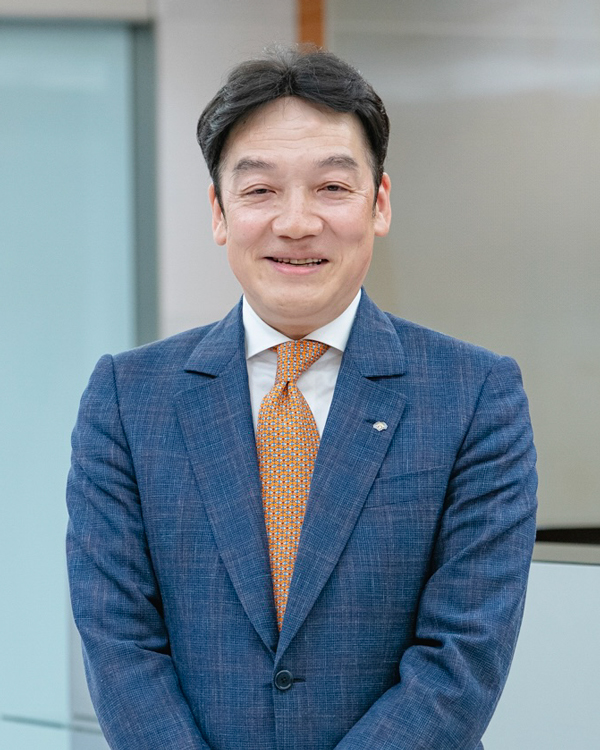
Yuji Matsumoto
Head of the Equity Research Department
Steel, Non-Ferrous Metals, and Cabling Analyst
Nomura Securities
Yuji Matsumoto joined Nomura Securities from Nomura Research Institute. Since 2008, he has specialized in the steel, non-ferrous metals, and cabling sectors. Leveraging his extensive experience covering the manufacturing industry, he has led collaborative research efforts with overseas team and across industries, focusing on comprehensive industry analysis and stock selection. He previously covered the glass, cement, pulp and paper, cosmetics, and toiletries sectors.
Matsumoto was a top-ranked analyst in Nikkei Veritas for paper and other materials (2006–2008), and for steel and non-ferrous metals (2017–2018). He was also No. 1 in Institutional Investor’s rankings for specialty materials (2008) and metals (2017).
He holds a master's degree from International Christian University’s Graduate School.
Notable strengths
He is known for his meticulousness and his engaging, persuasive communication skills.
